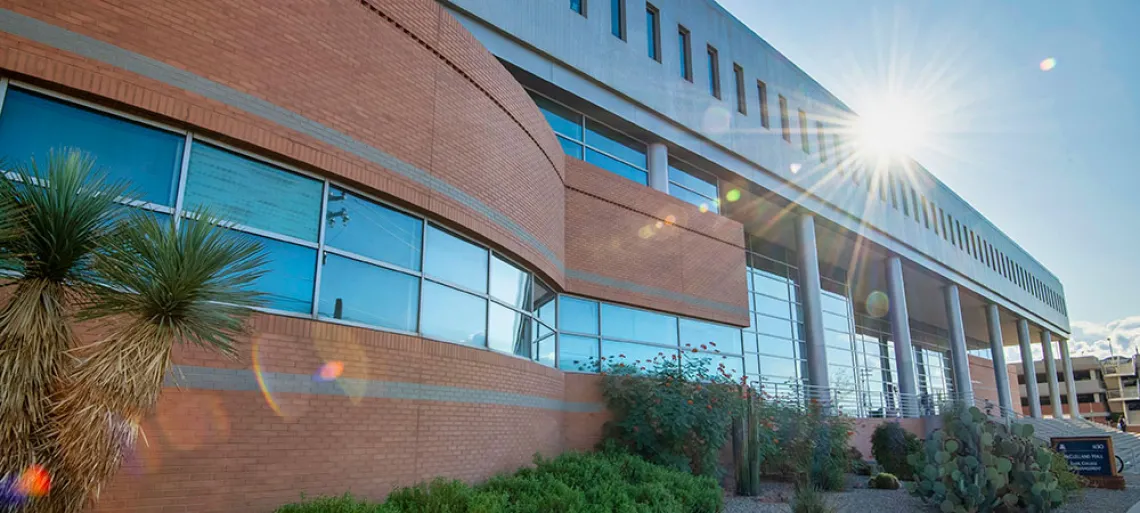MIS Department Pivots To Offer Internship Alternatives To Graduate Students

During Summer 2020, the Management Information Systems (MIS) Academic and Research Technologies Group (ARTG) in the Eller College of Management at the University of Arizona offered two summer projects to MIS graduate students in response to the internship shortage created by COVID-19. The students’ efforts and research proved to be not only successful, but impressive on all levels, especially given the unusual circumstances that come with learning and performing during a global pandemic.
Data Engineering Projects
The ARTG Data Engineering Project Team worked with 13 MIS graduate students to create projects focused on data engineering, data science and visualization. Students were instructed to develop an end-to-end data engineering project using modern public and free tools. The ARTG Data Engineering team, consisting of Program Managers Shikha Kandpal ’20 MS MIS and Sirisha Nookala ’20 MS MIS, Technical Resource, Patrick Brown, assistant director of ARTG, and Project Sponsor, John Moeller, director of ARTG, worked with students to iterate on their initial efforts, adding opportunities for self-learning.
There were seven Data Engineering Project groups, studying a wide range of topics:
- Telecom Customer Churn Analysis and Prediction
- Crimes in Boston Analyzed
- Analysis of Accidents in USA
- US Police Crimes
- Fantasy Premier League Points Predictor
- Detection of Fake Product Reviews Using NLP
- Demystifying Public Sentiments on Airline Reviews
“Not only did I gain knowledge about the newest technologies in the field of data from these projects, but I also got a first-hand experience of the challenges faced by a program manager in the real world,” says Nookala, who was the program manager for all seven projects. “It gave me a chance to apply the theoretical knowledge I learned in my master’s program and helped me in improving my practical knowledge.”
The virtual climate did not stop the students from working together and creating lasting relationships with each other. “There was a sense of community among the students and teams. Almost all the students in this program were affected by COVID-19, but their resiliency built a lot of positivity in me and my job search,” says Nookala.
The ARTG team constantly motivated the students to do their best and get the most out of their time.
“John and Yong Ge, assistant professor of MIS, helped us to pivot and think about the business problem in a different way and to try different techniques to make the results more desirable,” says Anmol Sabharwal ’20 MS MIS, who worked on the Fantasy Premier League Points Predictor project.
Learn more about the data engineering projects.
Python for Oracle Scripting Project
For this project, five MIS graduate students developed scripts and software in Python to administer to Oracle’s relational database management system (RDBMS) servers for instructional purposes. The team of graduate students working on this project included Devi Anandanathan ’20 MS MIS, Kaumudi Kulkarni ’20 MS MIS, Sagarika Latkar ’20 MS MIS, Shinjni Maheshwari ’20 MS MIS and Madhvika Sehgal ’20 MS MIS. Yash Jethmalani ’20 MS MIS served as the product owner and was responsible for establishing code quality standards, performing code reviews and serving as a subject-matter expert on Oracle RDBMS and Python.
“I had no experience developing software, so this project strengthened my project management skills and built my software development skills from scratch,” says Devi. “The soft skills I learned included communication as a project manager, establishing and experimenting with decision making management, as well as initiation of a project and how to keep everyone on track.”
Moeller, who was the project sponsor and an integral part of the ARTG team, explains how impactful this project was for the students and how expectations were exceeded throughout the summer, “The students learned more than any of us expected, often on elements that were less obvious from the outset. Many students made their projects better by learning new tools or expanding their network to gain valuable outsider input.”
Learn more about the Python for Oracle scripting project.
With the success of these two projects, the Department of MIS plans to implement more opportunities like these in the future, even after the COVID-19 pandemic.

